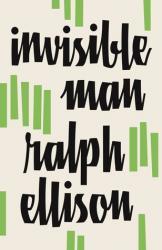
Ralph Ellison's Invisible Man is an essential American classic. Written in the late 1940s, it tells the story of a young African American man who moves north during the Harlem Renaissance and faces many trials as he attempts to find his place in society. This novel is a candid portrayal of life for Black Americans in the pre-Civil Rights era, exposing the hardships and prejudices that are often overlooked in retrospect but were all too real for Blacks during this time. It is honest, reflective, and blunt; often unsettling and disturbing. A central theme of Ellison's novel is the idea of blindness and how it affects identity. The protagonist is left confused and misguided as a result of the blindness of those he encounters, trying to fit into the expectations of others, until at last he realizes that he is, and has always been, "invisible" to society. With this revelation, the invisible man at last finds his own identity.
The novel recounts all of the events leading to the protagonist's discovery of his invisibility, beginning at his colored college in the south and taking the audience north to Harlem. The protagonist faces many different circumstances which reveal just how marginalized Blacks were in the United States in the 30s; each episode is a testament to the challenges faced by African Americans (even a reflection of the challenges faced by African Americans today) due to the blind discrimination of white people. Each incident faced by the invisible man is largely a reiteration of previous ones, merely taking place in different circumstances, which emphasizes his lack of identity--even his own blindness. Eventually, due to an unfortunate incident, the protagonist loses all sense of who he used to be, and this is what allows him to begin to make change--for better or worse. There are numerous violent and suggestive scenes in this novel, so I would recommend it to older, more mature teenagers.
Ellison takes his readers on a powerful, enlightening journey with Invisible Man. His compelling writing is intertwined with tragic humor and soulful undertones of blues and jazz, the backdrop for an incredibly raw and moving novel. The invisible man's story is very relevant to society today, and Ellison's messages should serve as reminders to us all. I believe every American would benefit from reading this novel at some point in their life; it illustrates such an important part of our nation's history, and that of African Americans. Ellison portrays the protagonist's emotions with such introspective depth, every conflict and thought explored in all its complexities. Invisible Man may not be a particularly fun read, but it is important and it is worthwhile.